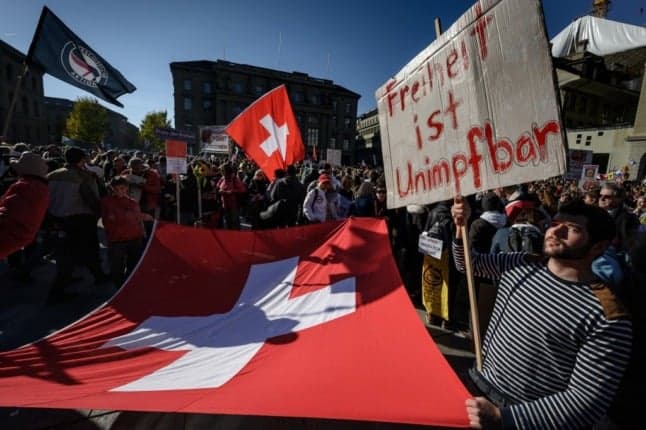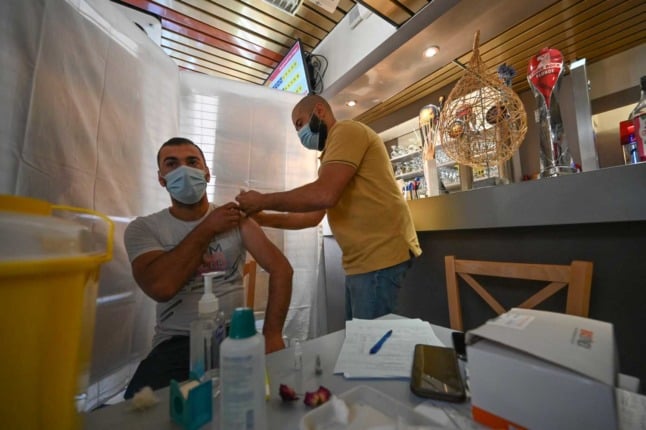Will Switzerland make the Covid vaccine compulsory?

As Austria is set to introduce compulsory vaccination and other European countries are considering the move, will the Swiss authorities follow? Here's what you need to know about mandatory jabs in Switzerland.
With Covid-19 sweeping through Europe again amid rising infection rates, some national leaders have opted to make vaccinations compulsory in a bid to stem the spread.
Austria is set to make Covid vaccines mandatory for everyone from February, while Italy is currently considering the same move for some groups - although it's not yet clear who this would apply to. There's already a vaccine mandate in place for health workers in some European countries too, such as Italy and France.
Switzerland’s current measures, on the other hand, are relatively relaxed when compared to most of Europe.
READ ALSO: Switzerland’s Covid cases are soaring again. Here’s why
Despite a 2021 record for new infections, the Swiss government on Thursday said it would not be following Germany and Austria’s lead of restricting bars, restaurants and events to the fully vaccinated and those recovered from the virus.
Currently, the government is putting faith in its vaccination campaign, but should infection rates rise higher, how likely is it that Switzerland would make vaccines mandatory?
'No legal basis'
This decision is off the table, in fact, as it's unconstitutional, meaning it's impossible to enforce in Switzerland.
"There is currently no legal basis for this," said Andreas Glaser, professor of constitutional law at the University of Zurich, according to Swiss newspaper '20 Minuten'.

A Swiss Covid certificate. (Photo by Fabrice COFFRINI / AFP)
There is some legal provision for making vaccinations obligatory, but the parameters are limited.
The Epidemics Act only allows the federal government and cantons to declare mandatory vaccinations of vulnerable groups and certain individuals under narrow conditions.
"However, no one can be forced to get vaccinated," the Federal Office of Public Health also states.
The federal government can't declare an extraordinary health situation and pass laws on its own authority.
READ MORE: How Switzerland’s direct democracy system works
"The Epidemic Act sets clear limits for the Federal Council on how far it can go with compulsory vaccination in extreme cases," Glaser clarified.
"If it really wanted to introduce compulsory vaccination for everyone, it would need a new or amended law - and this would have to be enacted by parliament," he added.
According to Glaser, it is unclear whether such a law could be passed on an urgent basis, meaning it would "come into force immediately without having to wait for the 100-day referendum period".
But the expert didn't think Switzerland was at the point where this would be feasible.
"For that to be possible, I think the pandemic would have to take on much worse dimensions, with significantly more fatalities," he stated.

Getting vaccinated in Switzerland. Photo: DENIS CHARLET / AFP
So, if the law is not declared urgent, Glaser thinks a referendum is possible, referring to the two referendums that have already taken place on Covid-19 law.
Switzerland is due to vote again on November 28th on its Covid-19 legislation, including the mandatory use of a Covid pass for fully vaccinated, recovered or tested-negative people.
The pass facilitates international travel and entry to public events and indoor spaces such as restaurants and concert venues.
READ ALSO:
- Switzerland rules out making restaurants ‘vaccinated only’ despite Covid case record
- What’s at stake in Switzerland’s Covid referendum on November 28th?
- Canton-by-canton: How visitors can get Switzerland’s Covid certificate
However, any decision on mandatory jabs instead would prolong the legislative process, giving "another reason why compulsory vaccination for everyone is not a sensible measure for Switzerland," according to Glaser.
"In a pandemic, it must be possible to react quickly," he added.
Other measures to contain the spread
So it looks like Switzerland would probably take another approach if the pandemic were to get out of control again.
The country would likely "negotiate more differentiated measures" such as introducing a 1G rule in places where the risk is particularly high, such as where many people gather in a small area.
The numbered 'G' rules refer to the German words for vaccinated, recovered and tested – geimpft/genesen/getestet – and have been used to describe the conditions required to take part in many activities in many German-speaking countries.
The 1G rule is very rare in Germany itself. The rule says that only vaccinated people have access to an event or an establishment, excluding those recovered and tested.
But even restricting indoor venues to both the vaccinated and the fully recovered was not proportionate with the threat posed by the virus, Swiss Health Minister Alain Berset said on Wednesday.
Referring to healthcare workers in the first instance, constitutional lawyer Glaser said, "At most, it would be conceivable and possible according to the Epidemic Law that the vaccination obligation would be extended to other occupational groups."
As things stand, he is clear: "The epidemiological situation is far from the point where we even have to discuss compulsory vaccination for everyone.
"And even if the situation worsens drastically, I can't imagine that a general vaccination obligation will ever come about in Switzerland in the course of this pandemic."
In Switzerland last week, Covid-19 hospitalisations increased by a quarter, while deaths were up more than 80 percent to 53 fatalities. Intensive care units are 77 percent full, with 17 percent of the overall capacity taken up by Covid-19 patients.
Comments
See Also
With Covid-19 sweeping through Europe again amid rising infection rates, some national leaders have opted to make vaccinations compulsory in a bid to stem the spread.
Austria is set to make Covid vaccines mandatory for everyone from February, while Italy is currently considering the same move for some groups - although it's not yet clear who this would apply to. There's already a vaccine mandate in place for health workers in some European countries too, such as Italy and France.
Switzerland’s current measures, on the other hand, are relatively relaxed when compared to most of Europe.
READ ALSO: Switzerland’s Covid cases are soaring again. Here’s why
Despite a 2021 record for new infections, the Swiss government on Thursday said it would not be following Germany and Austria’s lead of restricting bars, restaurants and events to the fully vaccinated and those recovered from the virus.
Currently, the government is putting faith in its vaccination campaign, but should infection rates rise higher, how likely is it that Switzerland would make vaccines mandatory?
'No legal basis'
This decision is off the table, in fact, as it's unconstitutional, meaning it's impossible to enforce in Switzerland.
"There is currently no legal basis for this," said Andreas Glaser, professor of constitutional law at the University of Zurich, according to Swiss newspaper '20 Minuten'.

There is some legal provision for making vaccinations obligatory, but the parameters are limited.
The Epidemics Act only allows the federal government and cantons to declare mandatory vaccinations of vulnerable groups and certain individuals under narrow conditions.
"However, no one can be forced to get vaccinated," the Federal Office of Public Health also states.
The federal government can't declare an extraordinary health situation and pass laws on its own authority.
READ MORE: How Switzerland’s direct democracy system works
"The Epidemic Act sets clear limits for the Federal Council on how far it can go with compulsory vaccination in extreme cases," Glaser clarified.
"If it really wanted to introduce compulsory vaccination for everyone, it would need a new or amended law - and this would have to be enacted by parliament," he added.
According to Glaser, it is unclear whether such a law could be passed on an urgent basis, meaning it would "come into force immediately without having to wait for the 100-day referendum period".
But the expert didn't think Switzerland was at the point where this would be feasible.
"For that to be possible, I think the pandemic would have to take on much worse dimensions, with significantly more fatalities," he stated.

So, if the law is not declared urgent, Glaser thinks a referendum is possible, referring to the two referendums that have already taken place on Covid-19 law.
Switzerland is due to vote again on November 28th on its Covid-19 legislation, including the mandatory use of a Covid pass for fully vaccinated, recovered or tested-negative people.
The pass facilitates international travel and entry to public events and indoor spaces such as restaurants and concert venues.
READ ALSO:
- Switzerland rules out making restaurants ‘vaccinated only’ despite Covid case record
- What’s at stake in Switzerland’s Covid referendum on November 28th?
- Canton-by-canton: How visitors can get Switzerland’s Covid certificate
However, any decision on mandatory jabs instead would prolong the legislative process, giving "another reason why compulsory vaccination for everyone is not a sensible measure for Switzerland," according to Glaser.
"In a pandemic, it must be possible to react quickly," he added.
Other measures to contain the spread
So it looks like Switzerland would probably take another approach if the pandemic were to get out of control again.
The country would likely "negotiate more differentiated measures" such as introducing a 1G rule in places where the risk is particularly high, such as where many people gather in a small area.
The numbered 'G' rules refer to the German words for vaccinated, recovered and tested – geimpft/genesen/getestet – and have been used to describe the conditions required to take part in many activities in many German-speaking countries.
The 1G rule is very rare in Germany itself. The rule says that only vaccinated people have access to an event or an establishment, excluding those recovered and tested.
But even restricting indoor venues to both the vaccinated and the fully recovered was not proportionate with the threat posed by the virus, Swiss Health Minister Alain Berset said on Wednesday.
Referring to healthcare workers in the first instance, constitutional lawyer Glaser said, "At most, it would be conceivable and possible according to the Epidemic Law that the vaccination obligation would be extended to other occupational groups."
As things stand, he is clear: "The epidemiological situation is far from the point where we even have to discuss compulsory vaccination for everyone.
"And even if the situation worsens drastically, I can't imagine that a general vaccination obligation will ever come about in Switzerland in the course of this pandemic."
In Switzerland last week, Covid-19 hospitalisations increased by a quarter, while deaths were up more than 80 percent to 53 fatalities. Intensive care units are 77 percent full, with 17 percent of the overall capacity taken up by Covid-19 patients.
Join the conversation in our comments section below. Share your own views and experience and if you have a question or suggestion for our journalists then email us at [email protected].
Please keep comments civil, constructive and on topic – and make sure to read our terms of use before getting involved.
Please log in here to leave a comment.